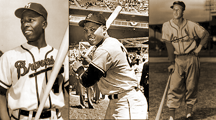No one should dispute the qualifications of our newest Hall of Fame members – Tony Gwynn and Cal Ripken, Jr. However, I believe others also ought to receive the call soon.
The Hall of Fame would benefit from more consensus regarding minimum membership qualifications. In time, such consensus probably will develop. Also, several procedural changes would assure more institutional consistency.
For example, the 75 percent voting requirement for admission serves an appropriate purpose by preventing mass inductions in any one election. However, the level is too high in determining whether anyone should be inducted. A small but determined minority can thwart the judgment of the majority and shut down the process.
The Writers
"Zero election" years by the Writers wastes time, disappoints the public and delays honors for well-deserving heroes. In every election, the ballots always have included at least one (and more) worthy candidate. Every first ranked candidate falling short eventually gained induction, either through the Writers or by a committee. Almost every candidate receiving at least 50 percent of the votes from the Writers has been inducted. (Gil Hodges is the most prominent exception.)
From election to election, the credentials of retired players don’t change. Shouldn’t emphasis be on the qualifications of the players rather than on the mindsets of the voters? The game needs and deserves its glorious Cooperstown week-ends - every year.
If no candidate receives the necessary 75 percent from the Writers, the candidate with the most votes should be inducted. It would be helpful, but not necessary, to give additional weight to first-place votes.
I can see a deluge of strong candidates becoming eligible in the next few years. The Writers also should reconsider the rule, which excludes candidates receiving a low percentage of votes. Some potentially worthy players have been excluded prematurely because they had the misfortune of appearing on the ballot when there were more than 10 superior candidates.
Veterans
Disappointingly, no Veteran candidate will be inducted along with Gwynn and Ripken, Jr. this weekend. No Veteran has gained induction in the three elections under the new procedures which began in 2003. The committee consists of living HOF members, mainly players. Will or can any Veteran ever be inducted under the present format? What good is a process that produces no inductions?
Of course, no one should be inducted just to prove that the Committee serves a useful function. Significantly, a majority of voters - in Ron Santo’s case, a high majority - favor induction of some candidates. Four received more than 50 percent of the votes, headed by Santo with almost 70 percent.
Among others, I suggest the following measures:
· If no Veteran receives 75 percent, one candidate with at least two-thirds support should be inducted. (Under this scenario, Santo would have been inducted in 2007.) (A reasonable minimum threshold could be as low as 55 percent.)
· Two years between elections is too long if there are no inductions. After zero election years, the Hall should conduct special elections for Veterans.
· Players, even HOF players, have no special expertise regarding managers, executives, umpires and other non-players. The non-players should be assigned to another committee.
HOF players are heroes of the game. If the process doesn’t operate well, HOF players may be subject to criticisms tarnishing their heroic images and damaging the institution.
The real challenge is to accord respect to all voters without having the institution unduly dominated by the minority.



